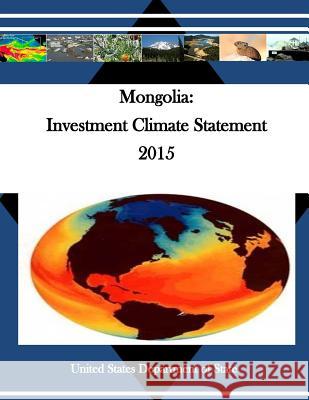Mongolia: Investment Climate Statement 2015 » książka
Mongolia: Investment Climate Statement 2015
ISBN-13: 9781530701292 / Angielski / Miękka / 2016 / 34 str.
Mongolia is a landlocked country located in North-East Asia. Foreign Direct Investment (FDI) into Mongolia has trended downward since its 2011 peak of USD 4.7 billion. Overall, FDI into Mongolia fell by 85 percent from 2011 through the first quarter of 2015, with USD 644 million of FDI in 2014. Some 80 percent of FDI into Mongolia annually targets the mining sector and falling global coal and copper prices have dampened investor interest. Mongolia's elected leaders readily accept, however, that government missteps (confiscating selected mining licenses, levying a mining-specific windfall profits tax, assuming veto rights over mining company business decisions, etc.) collectively amounted to a far greater disincentive to investment; these leaders say they recognize the need to correct course. Parliament's ousting of the Democratic Party-led coalition Government in November 2014 clearly reflected a lack of confidence in the government's economic policies. In December 2014, new Prime Minister Saikhanbileg led an all-party unity government into office vowing to focus its efforts virtually exclusively on Mongolia's battered economy, to make restoration of FDI the center of those efforts, and to put the launching at long last of two FDI-fueled mining mega-projects - OyuTolgoi (copper/gold) and TavanTolgoi (coal) - at the epicenter of efforts. The new PM initially received high grades from the Mongolian public for sincerity and determination but lower grades for results. A sign that the PM and his government mean to turn that situation around was the May 18, 2015, signing of the Oyu Tolgoi Underground Mine Development and Financing Plan (Plan) by representatives of the GOM and Rio Tinto. At the signing, Prime Minister Saikhanbileg said "Mongolia is back to business" and that Oyu Tolgoi is a world-class copper-gold asset and its further development is of great economic significance for Mongolia. He boldly asserted that Mongolia had finalized a way forward with its partners that established a new and constructive relationship based on mutual trust and joint long-term commitment to Mongolia's growth. The PM's robust, public defense of the Plan before Parliament on May 22 encouraged investors' belief that GOM is fundamentally changing its attitude toward FDI. However, investors also will judge the GOM's resolve by how it treats investments beyond OT. As most Mongolian eyes focus on Parliament, international investors have an additional and serious concern - the evident willingness of Mongolian state prosecutors and other authorities to unilaterally impose exit bans on foreign business executives whose companies become involved in business-related disputes with the government or individual Mongolian citizens. The 2015 conviction and imprisonment of three mining executives (among them a U.S. citizen) suggested to investors that Mongolian courts do not fully observe principles of due process, and that foreign investors risk being coerced into settling legal disputes on disadvantageous terms. In 2014, investors told us that those willing to realistically accept the challenges of Mongolia's commodity-driven economy and rough and tumble political and judicial processes might find profitable medium- to long-term investment opportunities. Mongolia, after all, has some of the world's largest untapped mineral reserves. For U.S. investors, mining and mining-related services represent the most important and potentially remunerative sectors for long-term investment in Mongolia. Other promising sectors include infrastructure, transportation, energy, construction, healthcare, agriculture, tourism, and environmental products and services. But investor concerns about weak rule of law in Mongolia require us to heavily caveat even last year's qualified endorsement.
Zawartość książki może nie spełniać oczekiwań – reklamacje nie obejmują treści, która mogła nie być redakcyjnie ani merytorycznie opracowana.











